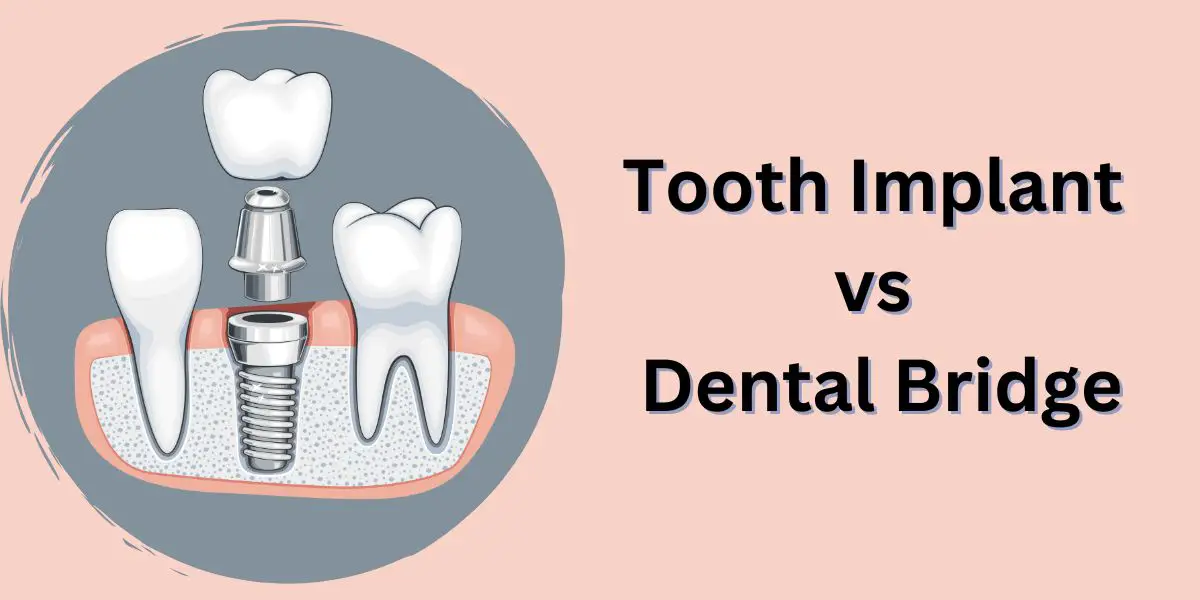Deciding between a tooth implant and a dental bridge is a crucial choice when dealing with tooth loss. Both options have unique benefits and considerations. This article aims to clarify the differences between tooth implants and dental bridges, helping you make an informed decision about the best solution for your dental health.
What are Tooth Implants?
Tooth implants are artificial tooth roots made of titanium. They are surgically placed into the jawbone beneath the gums, providing a sturdy foundation for fixed or removable replacement teeth that closely resemble natural teeth.
Procedure for Tooth Implants
- Consultation and Planning: A thorough examination and treatment plan are developed.
- Tooth Extraction (if necessary): If the tooth is damaged or decayed, it may need to be removed.
- Implant Placement: The titanium implant is surgically placed into the jawbone.
- Osseointegration: The implant fuses with the jawbone over a few months, ensuring stability.
- Abutment Placement: An abutment is attached to the implant to connect the replacement tooth.
- Placement of the Crown: A custom-made crown is placed over the abutment, completing the process.
Also Read: Are Potatoes Gluten-Free?
What is a Dental Bridge?
A dental bridge consists of one or more artificial teeth (pontics) held in place by dental crowns. These crowns are placed on the teeth adjacent to the gap, anchoring the bridge securely in place.
Procedure for Dental Bridges
- Preparation of Abutment Teeth: The teeth adjacent to the gap are prepared to receive crowns.
- Impressions: Detailed impressions of the teeth are taken to create a custom bridge.
- Fabrication of the Bridge: The bridge is fabricated in a dental lab based on the impressions.
- Fitting and Adjustment: The bridge is fitted and adjusted to ensure a proper fit.
- Cementing the Bridge in Place: Once the fit is perfect, the bridge is cemented onto the abutment teeth, completing the procedure.
Cost Comparison
In general, tooth implants are more expensive than dental bridges. The cost can vary based on factors such as the number of teeth to be replaced, the materials used, and any additional procedures required.
Durability and Longevity
Tooth implants are known for their durability and can last a lifetime with proper care. On the other hand, dental bridges typically last 5-15 years and may need to be replaced.
Maintenance
Tooth implants require regular brushing, flossing, and dental check-ups, similar to natural teeth. Dental bridges require special flossing tools to clean under the pontic and around the abutment teeth.
Aesthetics
Tooth implants closely resemble natural teeth and are highly aesthetic. Dental bridges can also be aesthetically pleasing but may not look as natural as implants.
Comfort and Functionality
Tooth implants feel and function like natural teeth, providing excellent comfort and stability. Dental bridges may feel less natural and can sometimes affect speech and eating habits.
Potential Complications
Tooth implants have a low risk of complications but may include infection, implant failure, or nerve damage. Dental bridges can cause decay or damage to abutment teeth if not properly maintained.
Suitability for Different Cases
Tooth implants are ideal for replacing a single tooth or multiple teeth. Dental bridges are suitable for replacing one or more adjacent teeth but may not be suitable if the adjacent teeth are weak or unhealthy.
Also Read: Are you looking to reduce your intake of refined sugars?
Advantages of Tooth Implants
- High success rate
- Preserve jawbone
- Prevents bone loss
- Do not affect adjacent teeth
Advantages of Dental Bridges
- Lower cost
- Less invasive procedure
- Faster treatment time
Conclusion
Both tooth implants and dental bridges offer effective solutions for replacing missing teeth, each with its own set of advantages and considerations. Consultation with a dentist is crucial to determine the best option based on your specific dental needs and budget.
Also Read: Top 10 High Protein Dry Fruits for Health
FAQs
Q1: Are tooth implants painful?
A1: The procedure is performed under local anesthesia, so you should not feel any pain during the surgery. Some discomfort may occur after the procedure, which can be managed with pain medication.
Q2: How long does it take to get a dental bridge?
A2: The entire process usually takes two to three weeks, including the preparation, fabrication, and fitting of the bridge.
Q3: Can dental bridges be whitened?
A3: Dental bridges cannot be whitened once they are in place. It’s essential to maintain good oral hygiene to prevent discoloration.
Q4: Can tooth implants get cavities?
A4: Tooth implants themselves cannot get cavities, but the surrounding teeth and gums are still susceptible to decay and infection.
Q5: Is it possible to get an infection after getting a dental bridge?
A5: Yes, it is possible to develop an infection after getting a dental bridge, especially if proper oral hygiene is not maintained.



